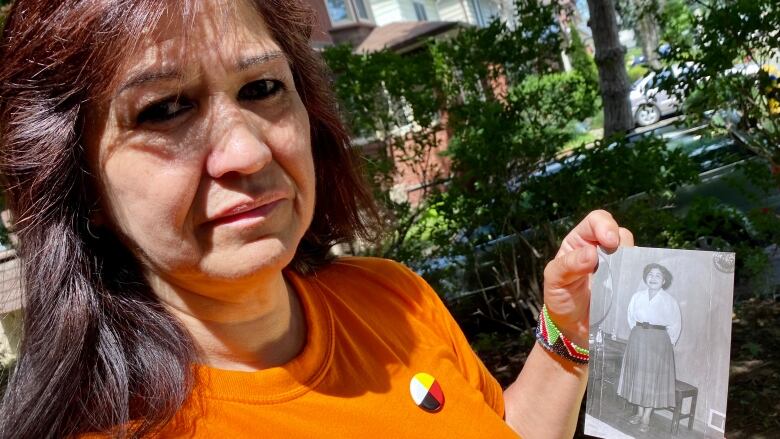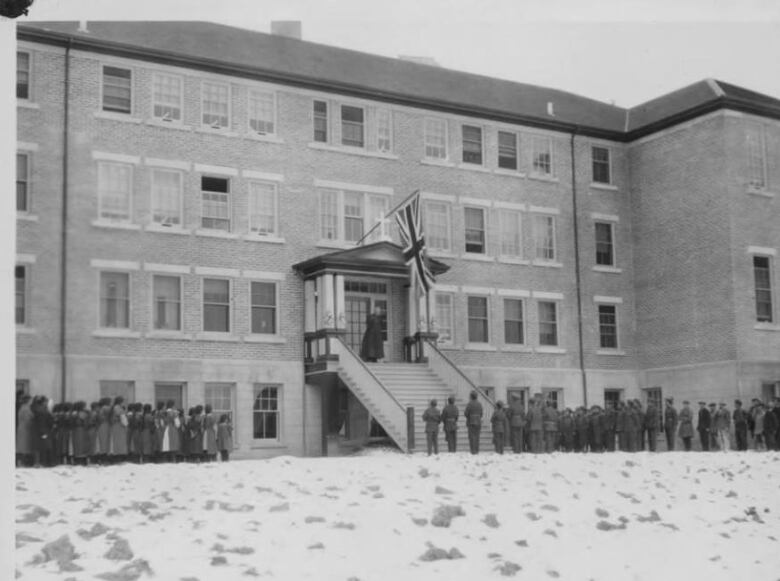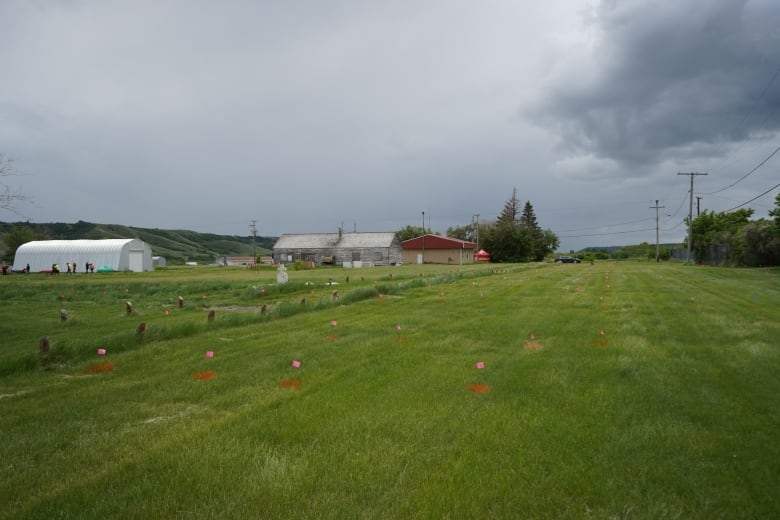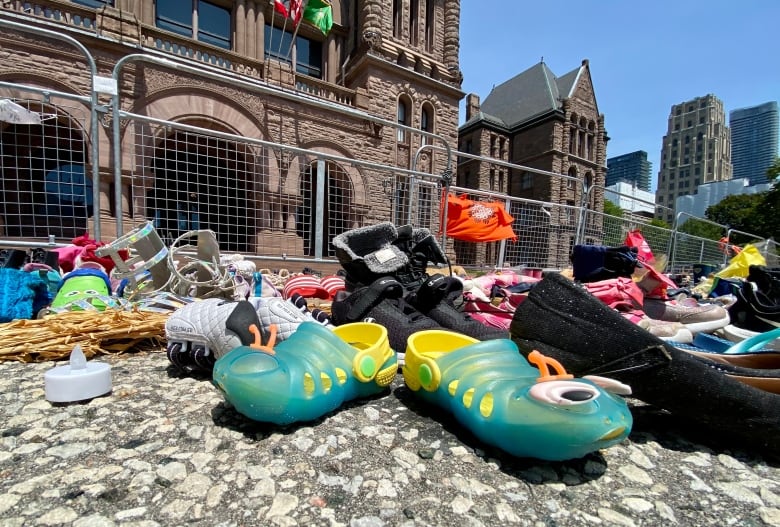Discovery of 751 unmarked graves 'has to be a wake-up call,' Indigenous women's group says
News of discovery in Saskatchewan 'the most tragic thing to hear,' Pamela Hart says

WARNING: This story contains details and imagery some readers may find distressing.
Pamela Hart couldn't hold back tears as she reflected on the announcement by the Cowessess First Nation of 751 unmarked graves found ina cemetery near the former Marieval Indian Residential School in Saskatchewan.
"I was frozen," said Hart, the executive director at the Native Women's Resource Centre of Toronto.
"And then as you sort of process the information and it sinks in, then all of the grief and emotion sort of come to the surface," she told CBC News Thursday. "So, now I feel just sick in general physically, spiritually, mentally, emotionally. It's very traumatizing."
According to Hart, while the news "wasn't surprising," it is "just grief."
On Thursday, Cowessess Chief Cadmus Delorme said it was not immediately clear if all the graves belonged to children, but that his people hadoral storiesabout both children and adults being buried there.
This week's announcement follows news last month that theTk'emlps te Secwpemc First Nation in B.C. founda burial site adjacent to the former Kamloops Indian Residential School. They said preliminary findings indicate the site contains the remains of 215 children. The discoverieshaveshocked and saddened Canadians across the country, prompting Prime Minister Justin Trudeau to call it "Canada's responsibility to bear."Trudeau hasalsodemanded thatthe Roman Catholic Church, which ran most of the schools, make a formal apology and publish their records.
But for Indigenous peoples, the sorrow and anger is immeasurably greater.
"It's grief and loss and so as a community member, as a mom I just feel everyone's pain," Hart said. "I feel the sadness that has come from the news because it's the most tragic thing to hear."
I think that spirit bigger than us here is ensuring that these tiny spirits, these tiny babies are being found. They deserve that, the families deserve that, the Nations deserve that.- Pamela Hart, executive director Native Women's Resource Centre of Toronto
She said while it's not something she and community membersdidn't know was a reality, when it actually comes out the way it has in the last couple of weeks, it emphasizes the realities of Indigenous peoples'history and existence.
Hart said it took unmarked graves of children and babies to get Canadians to"sort of perk up and start to care or start to listen," when for generations,Indigenous peoples have been speaking out and fighting for their existence, equality and value.
"I think thatspirit bigger than us here is ensuring that these tiny spirits, these tiny babies are being found. They deserve that, the families deserve that, the Nations deserve that.
"This has to be a message, this has to be a wake-up call and that action and meaningful respect and dignity of all Indigenous peoples in Canada has to start taking place," Hart added.

'They tried to beat the Indian out of her'
Speaking to CBC News Thursday from her Toronto home, Darlene Isaac had to wipe the tears from her eyes as she recalledthe abuse she suffered at the hands of her mother, who was taken away from her parents at eight years old.
Isaac saidher mother, who diedsix days before her 40th birthday in 1980,did the same things she endured atthe notorious Lejac Residential School in B.C.
"My first remembering of her abuse was that she shoved a cloth diaper down my throat, knocked my two front teeth down my throat and I was five years old. It was because I swept a cloth diaper into the dirt," Isaac told CBC News.
"She stabbed me once for not putting enough water in a pot for spaghetti.She pulled loaded guns on me.
"Her favourite thing was when she bathed me was holding me under the water to see how close she could get to drowning me," Isaac said.
According to Isaac, all her mother knew was hate, because that's what she was taught.
"They took her and they tried to beat the Indian out of her. So, they beat her, took away her language, took away her culture and then beat her, raped her and then pushed her out in the world and said, 'You go raise a family [like] what we've taught you,'" she said.
"So she did to me what they taught her and that was abuse."

Issac said the cycle of hate continued for more than two decades, but she was finally able to forgive her mother.
"I couldn't stand her, I hated her, I couldn't talk good about her and nothing," Isaac said.
"And then when I started getting more involved with my culture and I went to the healing ceremonies and traditional stuff was when I realized it wasn't her fault. It wasn't her fault at all," she continued.
"So, through all of my ceremonies I was able to forgive her and I believe that she's walking with me right now, helping me write my life story about my abuse, 27 years of it."
'They are not numbers. They are children'
Ontario NDP MPP Sol Mamakwa said as a person whoattended residential school, he is calling on all churches and governments that operated residential schools to release all their records.
"Forcing us, as Indigenous people and survivors, to conduct heartbreaking and gut-wrenching searches when records could spare us some of that pain is re-traumatizing and is ongoing institutional colonialism and oppression," Mamakwa wrote in a statement.

Mamakwa, who is also the Ontario NDP's critic for Indigenous and treaty relations, said theunmarked graves are a"horrific discovery."
"These children were taken from their parents, and never returned home. Their families never stopped searching for them, and never stopped missing them," Mamakwa said.
"They are not numbers. They are children. They are our ancestors and our cousins. They are people who should have had full lives, and whose children and grandchildren should be with us today."
Mamakwa said while discovering the lost children is necessary, it's not the only action that must be taken.
"The 94 calls to action of the Truth and Reconciliation Commission must be properly resourced and implemented," he said.
"Communities still need access to clean water, safe housing, and equitable access to health care, education and mental health supports. Indigenous people are still dramatically over-represented in the child welfare system," Mamakwaadded.
"Politicians expressing sorrow now at the discoveries of children's graves, but who have had the power to act for years and chose not to, need to stop thinking that words alone are enough."
Support is available for anyone affected by the lingering effects of residential school and those who are triggered by the latest reports.
A national Indian Residential School Crisis Line has been set up to provide support for residential school survivors and others affected. People can access emotional and crisis referral services by calling the 24-hour national crisis line: 1-866-925-4419.
With files from Chris Glover












_(720p).jpg)


 OFFICIAL HD MUSIC VIDEO.jpg)
.jpg)



























































































